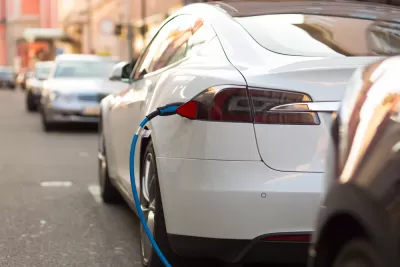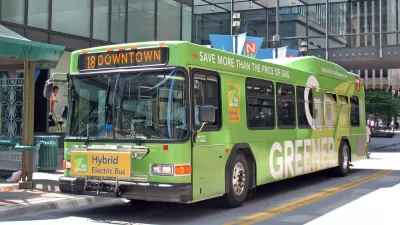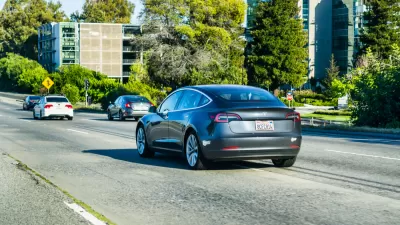It's not just Americans favor SUVs and light truck over compact cars, but that a majority of EV and hybrid owners who have traded in their cars are opting for all-gas vehicles, and that spells trouble for meeting President Obama's climate goals.

Recent research from the University of Michigan Transportation Institute (UMTRI) shows indicates that the single most effective way for American to reduce their personal greenhouse gas emissions is by changing their transportation behavior, particularly by driving less (or not at all) or driving vehicles that are fuel efficient (or emission-free).
The February report, "What Individual Americans Can Do To Assist In Meeting The Paris Agreement" [PDF] list six behavioral options (Table 2, page 9 of 28). The top two items listed by authors Dr. Michael Sivak Brandon Schoettle in reducing driving emissions are:
- 50% reduction: Buying a vehicle that gets 50 mpg (2.00 gal/100 mi) instead of a vehicle that gets 25 mpg (4.00 gal/100 mi).
- 10% reduction: Reducing the amount of driving by 10% without replacing it with other motorized transportation.
But since gas prices began their steady, consistent decline in the summer of 2014, vehicle efficiency has been going the wrong way. Consumers are responding to low gas prices, and it's particularly illustrated when they trade in their vehicles.
"So far this year, nearly 75 percent of the people who have traded in a hybrid or electric car to a dealer have replaced it with an all-gas car, an 18 percent jump from 2015, according to Edmunds.com, a car shopping and research site," writes Matt Richtel, technology correspondent for The New York Times.
The changing consumer patterns are in plain view at swapalease.com, a marketplace for people who want to get out of a car lease by transferring it to someone else. Dozens of hybrids and electric vehicles are available, in some cases languishing without bites from buyers.
2015 was a banner year for SUVs. Conventional hybrid vehicle sales have been on the wane since 2013 when they composed 3.19 percent of new car sales.

Credit: Wikimedia Commons
As Dr. Sivak often reminds us, cheap gas defeats fuel efficiency goals.
Richtel ends his piece on a hopeful note, pointing to the more affordable electric vehicles with extended range, such as the Tesla Model 3 and Chevrolet Bolt, entering the market next year that could change the paradigm.
Another positive note was in a June 2 email from the University of Michigan Transportation Research Institute which reports on month fuel efficiency changes.
"The average fuel economy (window-sticker value) of new vehicles sold in the U.S. in May 2016 was 25.4 mpg—up 0.2 mpg from the value for April 2016," wrote researchers Sivak and Schoettle. "This improvement likely reflects the increased price of gasoline in May, and the consequent increased interest in more fuel-efficient vehicles by buyers of all vehicle classes."
However, they also put that efficiency improvement in perspective.
"Fuel economy is down 0.4 mpg from the peak reached in August 2014, but still up 5.3 mpg since October 2007 (the first month of our monitoring)," they add.
Click here for a description of their calculations and the recent fuel efficiency values.
FULL STORY: American Drivers Regain Appetite for Gas Guzz

Alabama: Trump Terminates Settlements for Black Communities Harmed By Raw Sewage
Trump deemed the landmark civil rights agreement “illegal DEI and environmental justice policy.”

Study: Maui’s Plan to Convert Vacation Rentals to Long-Term Housing Could Cause Nearly $1 Billion Economic Loss
The plan would reduce visitor accommodation by 25% resulting in 1,900 jobs lost.

Planetizen Federal Action Tracker
A weekly monitor of how Trump’s orders and actions are impacting planners and planning in America.

Wind Energy on the Rise Despite Federal Policy Reversal
The Trump administration is revoking federal support for renewable energy, but demand for new projects continues unabated.

Passengers Flock to Caltrain After Electrification
The new electric trains are running faster and more reliably, leading to strong ridership growth on the Bay Area rail system.

Texas Churches Rally Behind ‘Yes in God’s Back Yard’ Legislation
Religious leaders want the state to reduce zoning regulations to streamline leasing church-owned land to housing developers.
Urban Design for Planners 1: Software Tools
This six-course series explores essential urban design concepts using open source software and equips planners with the tools they need to participate fully in the urban design process.
Planning for Universal Design
Learn the tools for implementing Universal Design in planning regulations.
Caltrans
Smith Gee Studio
Institute for Housing and Urban Development Studies (IHS)
City of Grandview
Harvard GSD Executive Education
Toledo-Lucas County Plan Commissions
Salt Lake City
NYU Wagner Graduate School of Public Service





























